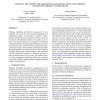Free Online Productivity Tools
i2Speak
i2Symbol
i2OCR
iTex2Img
iWeb2Print
iWeb2Shot
i2Type
iPdf2Split
iPdf2Merge
i2Bopomofo
i2Arabic
i2Style
i2Image
i2PDF
iLatex2Rtf
Sci2ools
136
click to vote
WSC
2007
2007
Expecting the unexpected: representing, reasoning about, and assessing construction project contingencies
Planning, scheduling and effective management of contingencies are crucial for the successful management of construction projects. In this paper we explore a mathematical representation of construction processes that can be used to infer alternative futures of a project as it unfolds. The representation has its foundations in temporal constraint networks. We present algorithms that can traverse the network in time, reason about the constraints driving a construction project, and present the combinatorial possibilities of futures that can emerge from one or more constraint violations during project implementation. The algorithms will aid construction managers to anticipate and react to crisis scenarios as they evolve in time. Our broader goal is to use the contingency information and the user responses to reveal the cognitive strategies used by humans to manage complex crisis scenarios.
Construction Project | Crisis Scenarios | Modeling And Simulation | Temporal Constraint Networks | WSC 2007 |
| Added | 02 Oct 2010 |
| Updated | 02 Oct 2010 |
| Type | Conference |
| Year | 2007 |
| Where | WSC |
| Authors | G. Ryan Anderson, Nilufer Onder, Amlan Mukherjee |
Comments (0)

